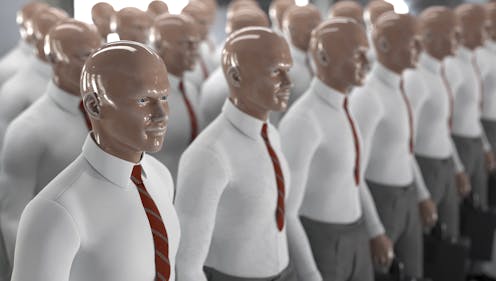
If you could take work-life balance to its most literal extreme, what would it look like? That’s the central theme of Severance, the sci-fi series that has just finished airing on Apple TV.
Employees working for the fictional corporation Lumon are able to undergo a procedure where their consciousness and memories are divided between work and home. Employees who have been “severed” do not remember anything about their life at work when they clock out, or anything about their home life during working hours.
Severance quickly becomes unsettling when it is implied that in isolating the memories of someone’s work life, a new person is created – a slave who lives only to work. These “new” employees (people’s work-selves) are told they can leave the office whenever they like, but inevitably find themselves sent back to work by their home life counterparts who don’t want to lose their jobs and do not have to endure the horror of living only in the office.
It’s safe to say most of us wouldn’t undergo such a procedure – after all, work is also a place where we make friends who can even help us in our home lives. But the concept presented in Severance raises deep philosophical questions about the relationship between our memories and ourselves.

Working to make a difference in the world but struggling to save for a home. Trying to live sustainably while dealing with mental health issues. For those of us in our twenties and thirties, these are the kinds of problems we deal with every day. This article is part of Quarter Life, a series that explores those issues and comes up with solutions.
More articles:
News of war can impact your mental health – here’s how to cope
Would you bring your dog to a shop? Why retailers should be more pet-friendly
Why it makes good business sense for your employer to look after your mental health
The show trades on the idea that personhood can be reduced to one’s conscious experiences. The idea being that “I” am the sum total of my remembered experiences, thoughts, desires and emotions, and that my life is the narrative these memories come together to form. As one Lumon employee puts it, “History makes us someone”. There is a rich tradition of philosophical thinking about memory that shares this way of understanding personal identity, most often associated with the 17th-century thinker John Locke.
Questions about personhood – what makes you you and not somebody else – were very important at Locke’s time of writing. For many 17th-century thinkers (for whom Christianity was part of the fabric of society, and atheism was virtually inconceivable), it was a given that after our mortal lives, we would go on to live some kind of afterlife. But who exactly will live that life?
Locke’s answer is that for everyone, “consciousness always accompanies thinking, and ‘tis that, that makes every one to be, what he calls self”. In other words, I am what I am conscious of. He adds that “as far as this consciousness can be extended backwards to any past action or thought, so far reaches the identity of that person”.
Locke teaches us that whatever I remember doing –- and only what I remember doing – was done by me. Thus, so long as I continue to have conscious experiences in the afterlife (and remember my past ones), I continue to exist.
The case of literal work-life severance is interesting precisely because the process creates a new person – one who comes into existence (starts being conscious) only when the severing procedure is over. Since that new person only remembers being conscious at work, that person only exists at work. This also seems to be how people within Severance are thinking about things. By cutting myself from my work life, I can avoid having the stresses of work “leak” into the rest of my life, and be a different person when I clock out.
The Locke problem
The early episodes of the show suggest that the seemingly neat separation of work-me and home-me is going to cause problems. Likewise, philosophers who responded to Locke – 18th-century thinkers like George Berkeley and Thomas Reid – pointed out that his account of personhood leads to absurdities.
Am I not the baby who was born on my birthday, because I don’t remember it? Will I not be the old man living through the 2050s if I don’t remember this particular day in 2022? Am I to be absolved of any crimes I commit when I get blackout drunk because I am not, now, in the cold light of day, conscious of them? Such questions led these thinkers to develop alternative accounts of what makes me me – perhaps it’s my soul?.

There are signs that within the world of Severance, there is more to a person than what they can remember. In the opening episode, the main character goes home to find that he has a cut on his forehead from an accident at work that of course, he cannot remember. This is an ominous sign that the scars that your work-self accrues are scars on you, and not some other person. More worryingly, perhaps this means that severed employees are subjecting themselves to a tortuous existence – one made worse by the fact that they cannot remember it.
There are good reasons to believe that who “I” am is more than just what I remember – after all, many things have happened to me that I cannot easily recall. How many of us struggle to remember big moments in life, like job interviews?
The timing of Severance’s release is interesting because, after two years of working from home, genuine work-life separation seems less realistic than ever. For many, “work” is not some place we leave home for every morning, but perhaps a spare room or a kitchen table. Consequently, many of us are looking for ways to establish a clean divide between work and our personal lives. But – in line with the message at the heart of Severance – perhaps instead, we should be trying to make peace between the different parts of our lives and thereby understand our full selves better.
Peter West does not work for, consult, own shares in or receive funding from any company or organisation that would benefit from this article, and has disclosed no relevant affiliations beyond their academic appointment.
This article was originally published on The Conversation. Read the original article.







